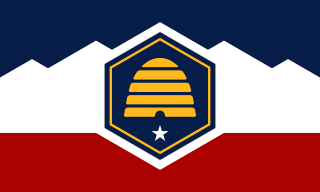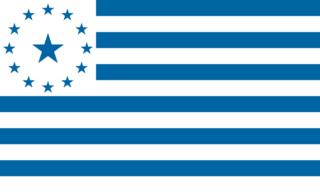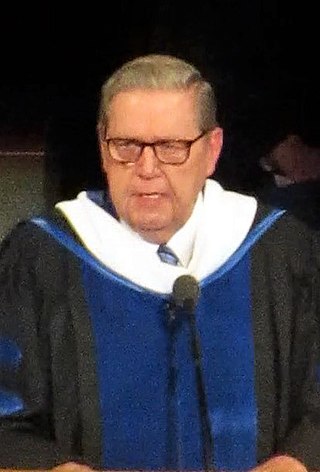Deseret may refer to:
The Deseret alphabet is a phonemic English-language spelling reform developed between 1847 and 1854 by the board of regents of the University of Deseret under the leadership of Brigham Young, the second president of the Church of Jesus Christ of Latter-day Saints. George D. Watt is reported to have been the most actively involved in the development of the script's novel characters, which were used to replace those of Isaac Pitman's English phonotypic alphabet. He was also the "New Alphabet's" first serious user.

Utah is a landlocked state in the Mountain West subregion of the Western United States. It is bordered to its east by Colorado, to its northeast by Wyoming, to its north by Idaho, to its south by Arizona, and to its west by Nevada. Utah also touches a corner of New Mexico in the southeast. Of the fifty U.S. states, Utah is the 13th-largest by area; with a population over three million, it is the 30th-most-populous and 11th-least-densely populated. Urban development is mostly concentrated in two areas: the Wasatch Front in the north-central part of the state, which is home to roughly two-thirds of the population and includes the capital city, Salt Lake City; and Washington County in the southwest, with more than 180,000 residents. Most of the western half of Utah lies in the Great Basin.

The Mountain Meadows Massacre was a series of attacks during the Utah War that resulted in the mass murder of at least 120 members of the Baker–Fancher emigrant wagon train. The massacre occurred in the southern Utah Territory at Mountain Meadows, and was perpetrated by settlers from the Church of Jesus Christ of Latter-day Saints involved with the Utah Territorial Militia who recruited and were aided by some Southern Paiute Native Americans. The wagon train, made up mostly of families from Arkansas, was bound for California, traveling on the Old Spanish Trail that passed through the Territory.
Deseret is a term derived from the Book of Mormon, a scripture of the Church of Jesus Christ of Latter-day Saints and other Latter Day Saint groups. According to the Book of Mormon, "deseret" meant "honeybee" in the language of the Jaredites, a group in the Book of Mormon that were led by God to the Americas after the construction of the Tower of Babel. Latter-day Saint scholar Hugh Nibley suggested an etymology by associating the word "Deseret" with the ancient Egyptian dsrt, a term referring to the "bee crown" of the Lower Kingdom.

The State of Deseret was a proposed state of the United States, promoted by leaders of the Church of Jesus Christ of Latter-day Saints who had founded settlements in what is today the state of Utah. A provisional state government operated for nearly two years in 1849-50, but was never recognized by the United States government. The name Deseret derives from the word for "honeybee" in the Book of Mormon.

The Territory of Utah was an organized incorporated territory of the United States that existed from September 9, 1850, until January 4, 1896, when the final extent of the territory was admitted to the Union as the State of Utah, the 45th state. At its creation, the Territory of Utah included all of the present-day State of Utah, most of the present-day state of Nevada save for Southern Nevada, much of present-day western Colorado, and the extreme southwest corner of present-day Wyoming.

Jeffrey Roy Holland is an American educator and religious leader. He served as the ninth President of Brigham Young University (BYU) and is the acting president of the Quorum of the Twelve Apostles of the Church of Jesus Christ of Latter-day Saints. As a member of the Quorum of the Twelve, Holland is accepted by the church as a prophet, seer, and revelator. Currently, he is the third most senior apostle in the church.

Richard Alan Dutcher is an American independent filmmaker who produces, writes, directs, edits, and frequently stars in his films. After making God's Army, a successful 2000 movie about LDS missionaries, Dutcher became well known among members of the Church of Jesus Christ of Latter-day Saints. Film critic Jeff Vice, of the Deseret News, dubbed Dutcher "The Godfather of Mormon Cinema," a title that is very important personally for Dutcher. In 2007, Dutcher left the LDS Church.

The Deseret News is a multi-platform newspaper based in Salt Lake City, published by Deseret News Publishing Company, a subsidiary of Deseret Management Corporation, which is owned by the Church of Jesus Christ of Latter-day Saints. Founded in 1850, it was the first newspaper to be published in Utah. The publication's name is from the geographic area of Deseret identified by Utah's pioneer settlers, and much of the publication's reporting is rooted in that region.

Mormon cinema usually refers to films with themes relevant to members of the Church of Jesus Christ of Latter-day Saints. The term has also been used to refer to films that do not necessarily reflect Mormon themes but have been made by Mormon filmmakers. Films within the realm of Mormon cinema may be distinguished from institutional films produced by the LDS Church, such as Legacy and Testaments, which are made for instructional or proselyting purposes and are non-commercial. Mormon cinema is produced mainly for the purposes of entertainment and potential financial success.

Deseret Book is an American publishing company headquartered in Salt Lake City, Utah, that also operates a chain of bookstores throughout the western United States. It is a wholly owned subsidiary of Deseret Management Corporation (DMC), the holding company for business firms owned by the Church of Jesus Christ of Latter-day Saints. Deseret Book is a for-profit corporation registered in Utah. Deseret Book publishes under four imprints with media ranging from works explaining LDS theology and doctrine, LDS-related fiction, electronic resources, and sound recordings such as The Tabernacle Choir at Temple Square albums.
Cove Fort is a fort, unincorporated community, and historical site located in Millard County, Utah. It was founded in 1867 by Ira Hinckley at the request of Brigham Young. One of its distinctive features is the use of volcanic rock in the construction of the walls, rather than the wood used in many mid-19th-century western forts. This difference in construction is the reason it is one of very few forts of this period still surviving.

George Reynolds was a general authority of the Church of Jesus Christ of Latter-day Saints, a longtime secretary to the church's First Presidency, and a party to the 1878 United States Supreme Court case Reynolds v. United States, the first freedom of religion case to issue from that court.
Utah is a state in the United States.

Church Historian and Recorder is a priesthood calling in the Church of Jesus Christ of Latter-day Saints. The role of the Church Historian and Recorder is to keep an accurate and comprehensive record of the church and its activities. His office gathers history sources and preserves records, ordinances, minutes, revelations, procedures, and other documents. The Church Historian and Recorder also chairs the Historic Sites Committee and Records Management Committee, and may act as an authoritative voice of the church in historical matters.
The Association for Mormon Letters (AML) is a nonprofit organization founded in 1976 to "foster scholarly and creative work in Mormon letters and to promote fellowship among scholars and writers of Mormon literature." Other stated purposes have included promoting the "production and study of Mormon literature" and the encouragement of quality writing "by, for, and about Mormons." The broadness of this definition of LDS literature has led the AML to focus on a wide variety of work that has sometimes been neglected in the Mormon community. It publishes criticism on such writing, hosts an annual conference, and offers awards to works of fiction, poetry, essay, criticism, drama, film, and other genres. It published the literary journal Irreantum from 1999 to 2013 and currently publishes an online-only version of the journal, which began in 2018. The AML's blog, Dawning of a Brighter Day, launched in 2009. As of 2012, the association also promotes LDS literature through the use of social media. The AML has been described as an "influential proponent of Mormon literary fiction."

The following outline is provided as an overview of and topical guide to Utah:

The Church of Jesus Christ of Latter-day Saints in Utah refers to the Church of Jesus Christ of Latter-day Saints and its members in Utah. Utah has more church members than any other U.S. state or country. The LDS Church is also the largest denomination in Utah.

Early in its history, the Church of Jesus Christ of Latter-day Saints had a series of negative encounters with the federal government of the United States. This led to decades of mistrust, armed conflict, and the eventual disincorporation of the church by an act of the United States Congress. The relationship between the church and the government eventually improved, and in recent times LDS Church members have served in leadership positions in Congress and held other important political offices. The LDS Church becomes involved in political matters if it perceives that there is a moral issue at stake and wields considerable influence on a national level with over a dozen members of Congress having membership in the church in the early 2000s, and about 80% of Utah state lawmakers identifying as LDS.

Melissa Leilani Larson is an American writer and playwright based in Salt Lake City, Utah. Mormon literature critic Michael Austin described her as "one of the true rising stars of Mormon literature." Producer Jeremy Long described her as the "best playwright in Utah." Her plays commonly feature women in leading roles, and some center around the faith of members of the Church of Jesus Christ of Latter-day Saints.